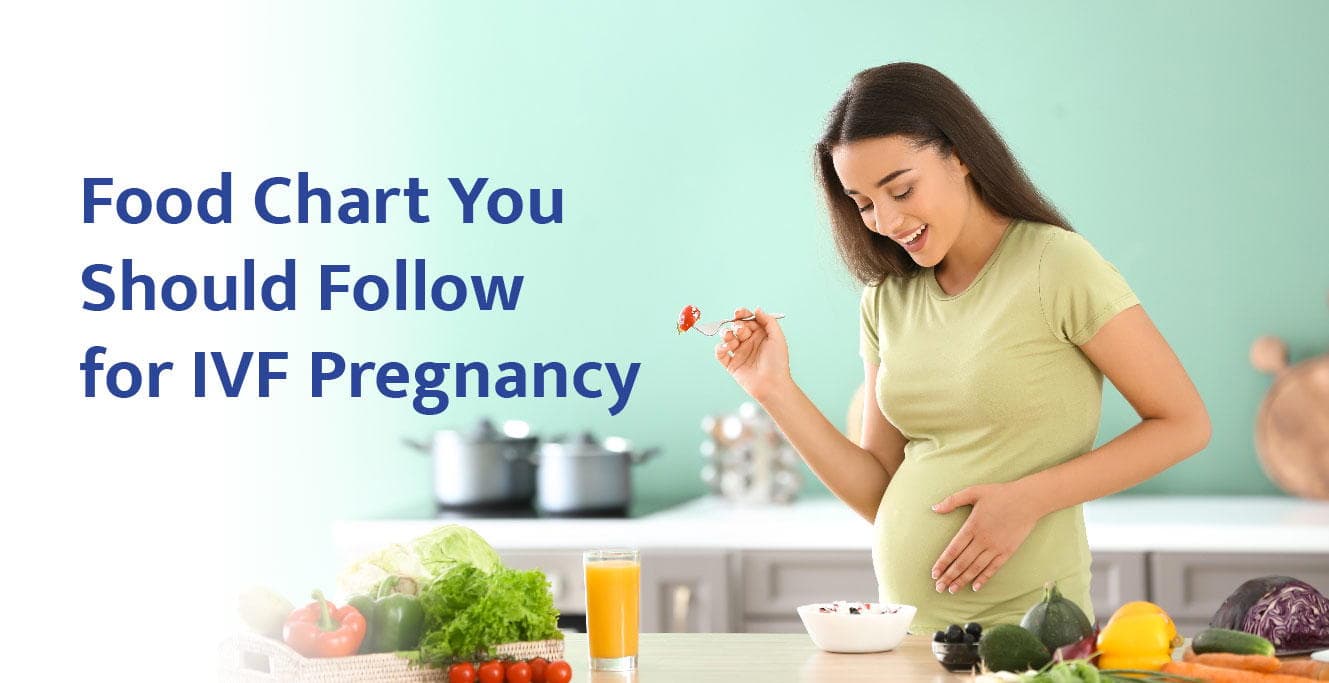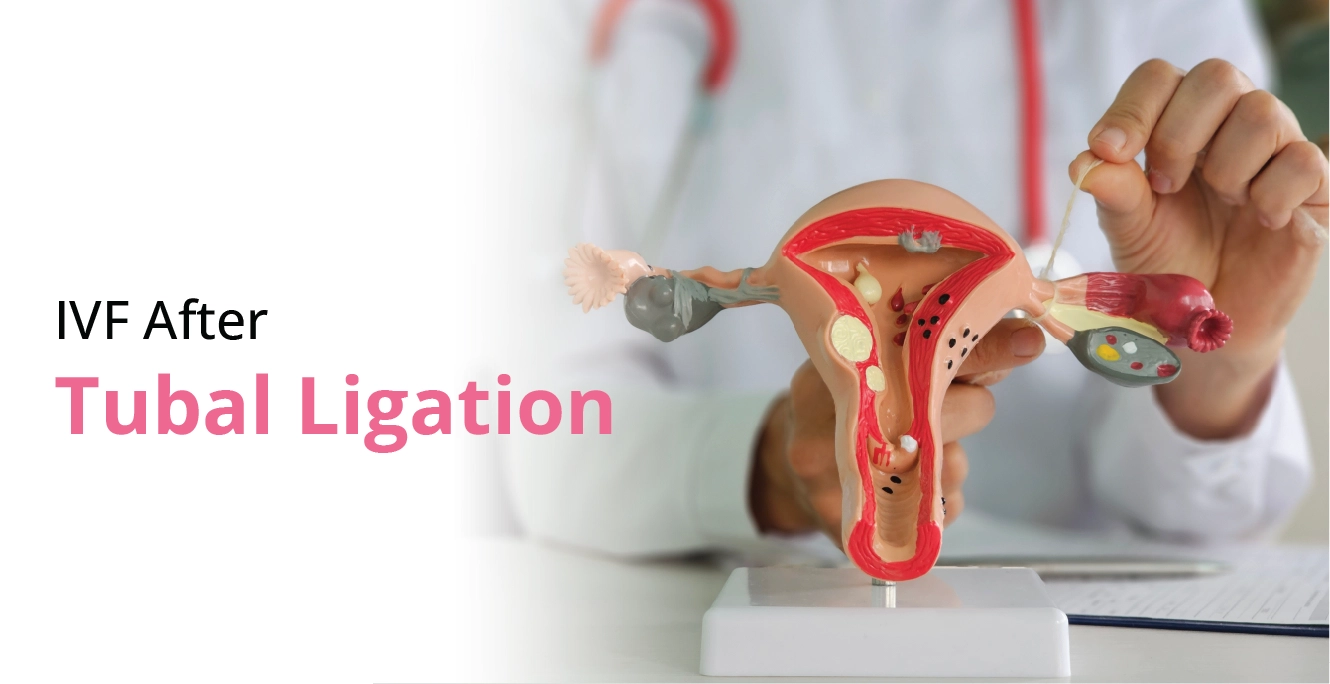
IVF Diet Plan: Boost Your Chances of a Successful Pregnancy

Table of Contents
- Why and When Should I Follow the IVF Diet Chart?
- How Does a Healthy Diet Affect the IVF Success Rate?
- Role of Nutrition in IVF Success
- Importance of a Healthy Diet After an IVF Injection
- IVF-Friendly Diet Chart: Foods to Embrace and Foods to Avoid
- Sample Diet Chart for Patients Undergoing IVF: Breakfast, Lunch and Dinner
- General Tips
- The Bottom Line
Have you ever wondered if the food you eat has a significant impact on your fertility?
Undergoing In Vitro Fertilisation (IVF) is an inspiring journey filled with hope and possibilities, but it also presents unique challenges. Amid the focus on medical procedures, the role of nutrition is often overlooked. What you eat during your IVF cycle can play a crucial role in the success of your treatment and the health of your future baby.
In this guide, we’ll outline an IVF diet chart, detailing foods to include and avoid, along with practical tips to help you plan meals for the best possible outcomes.
Why and When Should I Follow the IVF Diet Chart?
Preparing your body for IVF is a crucial step to maximising your chances of success for several reasons:
- It can help elevate your fertility potential by providing essential nutrients that support egg and sperm count.
- A well-balanced diet minimises the risks of complications during the IVF process and pregnancy.
- Proper nutrition supports a healthy pregnancy, ensuring the optimal development of your growing baby.
Ideally, you should start following an IVF-friendly diet at least three months before beginning treatment. This allows your body sufficient time to benefit from the positive changes in your nutrition and lifestyle, enhancing the chances of IVF success.
How Does a Healthy Diet Affect the IVF Success Rate?
A healthy, balanced diet plays a significant role in the success of your IVF treatment. Here’s how:
-
Supports egg and embryo development: Consuming foods rich in essential nutrients like folic acid, calcium, magnesium, and iron supports the development of healthy eggs and embryos.
-
Maintains hormonal balance: Incorporating whole grains, dairy products, and healthy fats into your diet helps maintain hormonal balance, which is crucial for successful IVF.
-
Promotes healthy cells: Fruits, vegetables, and nuts contain antioxidants that reduce oxidative stress and prevent DNA damage, promoting healthier cells and better IVF outcomes.
-
Contributes to energy and metabolic health: Complex carbohydrates and whole grains help sustain energy levels and manage blood sugar, contributing to overall reproductive well-being.
A study has revealed that there is strong evidence indicating that a healthy dietary situation may be beneficial to both male and female fertility. This makes following an IVF food diet even more essential for IVF patients!
Role of Nutrition in IVF Success
Certain nutrients play a vital role in optimising your fertility and supporting a healthy pregnancy. These impact both your egg quality and overall reproductive health. To optimise your IVF success, focus on including these essential nutrients in your diet:
|
Nutrient |
Benefits |
Food Sources |
|---|---|---|
|
Folic Acid |
Reduces the risk of neural tube defects, supports placental development |
Leafy greens, citrus fruits, fortified grains |
|
Omega-3 Fatty Acids |
Improves egg quality, reduces inflammation |
Fatty fish, flaxseeds, chia seeds, walnuts |
|
Vitamin D |
Supports embryo implantation and foetal development |
Fatty fish, egg yolks, fortified dairy products |
|
Protein |
Essential for cell growth and repair |
Lean meats, fish, eggs, legumes, nuts |
|
Iron |
Supports placental development, prevents anaemia |
Red meat, poultry, fish, legumes, fortified grains |
|
Zinc |
Regulates hormone production and supports ovulation |
Nuts, whole grains |
Importance of a Healthy Diet After an IVF Injection
During your IVF cycle, you’ll be receiving hormone injections to stimulate egg production. Maintaining a healthy diet after IVF injections is crucial for several reasons:
-
Supports embryo implantation: A balanced IVF diet rich in essential nutrients helps create an optimal environment for the embryo to implant successfully.
-
Promotes early pregnancy development: Proper nutrition supports the early stages of pregnancy, ensuring healthy growth of the foetus.
-
Regulates hormones: A well-rounded diet helps regulate hormones, which is pivotal during IVF treatment for successful follicle development, ovulation, and embryo implantation.
-
Reduces inflammation: Anti-inflammatory foods help maintain a healthy environment for the embryo to thrive.
-
Boosts energy levels: Healthy fats and complex carbohydrates provide sustained energy during the IVF journey.
Therefore, remember to:
- Stay hydrated by drinking plenty of water and electrolyte-rich fluids.
- Consume protein-rich foods to support egg development and minimise the risk of ovarian hyperstimulation syndrome (OHSS), a complication of fertility treatments.
- Avoid foods that may cause bloating or discomfort, such as carbonated drinks, spicy foods, and fried foods.
IVF-Friendly Diet Chart: Foods to Embrace and Foods to Avoid
Here is a guide to foods you can take and foods you should avoid during your IVF treatment.
| Foods to Eat | Foods to Avoid |
| Green Leafy Vegetables
Rich in antioxidants, folic acid, and iron. |
High-Sodium Foods
Excess salt may affect hormonal regulation. |
| Cabbage
Contains Di-indole methane for estrogen metabolism. |
Artificial Sweeteners
Saccharin can reduce IVF success rates. |
| Broccoli
High in Vitamin C, aids egg maturation. |
Refined Sugars
Strains the liver and impacts fertility. |
| Potatoes
Provide vitamins B and E, and boost cell division. |
Raw/Undercooked Seafood
High in mercury, risks birth defects. |
| Bananas
Rich in Vitamin B6, regulates menstrual cycles |
Alcohol
Disrupts ovulation and harms egg health. |
| Pineapple
Contains manganese to boost reproductive hormones. |
Caffeine
Excess coffee and tea affect fertility treatments. |
| Salmon
Omega-3 fatty acids help estrogen balance and blood flow. |
Processed Meats
High in trans fats and preservatives, impacts hormone balance. |
| Nuts and Seeds
Provide healthy fats and essential nutrients. |
Carbonated Beverages
Contains excess sugar and harmful additives |
| Whole Grains
Maintain energy levels and regulate insulin. |
Fried and Fatty Foods
Increase inflammation and reduce fertility potential. |
Sample Diet Chart for Patients Undergoing IVF: Breakfast, Lunch and Dinner
Here’s a sample IVF pregnancy food chart to help you plan your meals for a week. It emphasises nutrient-dense foods to support overall health and fertility.
|
Day |
Breakfast |
Morning Snack |
Lunch |
Evening Snack |
Dinner |
|
Monday |
Oats porridge with almonds and banana |
A small bowl of mixed fruits (papaya, apple, and berries) |
Quinoa salad with mixed vegetables and chickpeas, drizzled with olive oil and lemon |
Roasted chickpeas or a handful of nuts |
Grilled paneer with sautéed spinach and whole wheat roti |
|
Tuesday |
Smoothie with spinach, banana and Greek yoghurt |
Carrot and cucumber sticks with hummus |
Brown rice with dal and a side of steamed broccoli |
Whole grain toast with avocado |
Vegetable khichdi with a side of curd |
|
Wednesday |
Poha with peas and peanuts |
Fresh coconut water |
Mixed vegetable curry with bajra roti |
Baked sweet potato |
Fish curry (or tofu) with brown rice and a side salad |
|
Thursday |
Idli with sambar and coconut chutney |
A small bowl of walnuts |
Whole wheat chapati with palak paneer and cucumber raita |
Masala chai with two whole-grain biscuits |
Lentil soup with mixed greens and quinoa |
|
Friday |
Chia pudding with almond milk and topped with berries |
Sliced apple with peanut butter |
Vegetable biryani with a side of yoghurt |
Sprout salad with tomatoes, onion and lemon dressing |
Chicken (or tofu) stir-fry with bell peppers and brown rice |
|
Saturday |
Ragi porridge with jaggery and nuts |
A handful of mixed seeds |
Chana masala with steamed basmati rice |
Dhokla |
Grilled vegetables with quinoa and a side of curd |
|
Sunday |
Vegetable upma with a side of yoghurt |
A small bowl of berries |
Stuffed paratha (with spinach or cauliflower) and a side of pickle |
Roasted fox nuts -makhana |
Egg curry (or tofu curry) with whole wheat chapati |
General Tips
- Hydration: Drink plenty of water throughout the day. Herbal teas are also beneficial.
- Protein intake: Include a good source of protein in every meal.
- Fruits and vegetables: Aim for a mix of colours to maximise nutrient intake.
- Healthy fats: Incorporate sources like nuts, seeds, and olive oil.
- Avoid processed foods: Limit sugar and refined carbs as much as possible.
The Bottom Line
Following an IVF diet chart can significantly improve your chances of a successful IVF cycle and a healthy pregnancy. Focus on incorporating nutrient-dense foods that support fertility and foetal development while minimising processed and high-fat foods.
Remember, a well-balanced IVF food diet is just one aspect of your journey. Combine it with regular exercise, stress management techniques, and the guidance of your fertility specialist for the best possible outcomes.
Word from the Expert:
Women undergoing IVF can enhance ovarian response by adopting a diet high in antioxidants, including fruits, vegetables, nuts, and whole grains. Consuming at least five servings of fruits and vegetables daily is linked to improved egg quality and a significant increase in successful implantation rates. This complements traditional Indian dietary practices and underscores the importance of nutrition during IVF treatment. ~ Muskaan Chhabra
Our Fertility Specialists
Related Blogs
To know more
Birla Fertility & IVF aims at transforming the future of fertility globally, through outstanding clinical outcomes, research, innovation and compassionate care.
Had an IVF Failure?
Talk to our fertility experts

 Our Centers
Our Centers



















